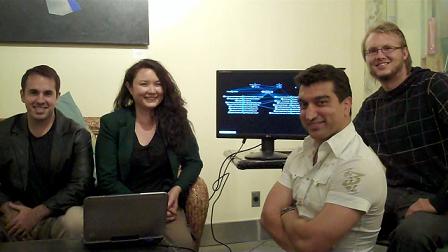
How would you like to perform cutting edge biology experiments out of your garage? That’s what the people at BioCurious did until they grew out of it. Now they’re ready for a real lab. BioCurious is a homespun organization in the San Francisco Bay Area that seeks to bring science back into the hands of the community. How will they do this? By actually getting interested people to perform real science experiments. It’s do-it-yourself biology only with expert friends supporting you and real lab equipment on hand. In the DIYbiology movement, BioCurious is a promising sign of what will hopefully occur around the world – ordinary people coming together to explore their world through science and technology. In order to fulfill their vision, BioCurious founders have been raising money to fund their new and improved community lab. They’re just 10 days, and $3000 away from reaching their KickStarter fund raising goal. Even without the lab, BioCurious has been hosting regular meetups to keep the community invigorated. I attended the latest of these Monday night and had a chance to talk with founding members Eri Gentry, Tito Jankowski, and Joseph Jackson. Don’t get too excited, but BioCurious could help bring back the age of the citizen scientist.
As I mentioned in my earlier discussion on DIY biology labs, BioCurious is a necessary part of bringing science to the masses. Experiments in your garage are great, but unless you have a really amazing garage you’re quickly going to run into things you can’t handle. The opponents of DIY biology often point to waste disposal, insurance, and safety as big reasons why this kind of science should never become a hobby. Yet BioCurious looked at these challenges and worked hard to come up with a solution. Worried about what havoc hobbyists might wreck in their homes? Well then we’ll just create a community lab that meets all the appropriate safety, insurance, and waste disposal standards you require. Getting BioCurious their new lab is going to be a great step in demonstrating that non-scientists can still access and explore biology responsibly (have you gone to their kickstarter page yet?)
But groups like BioCurious are about more than just providing a lab space, they’re also about growing a community of citizen scientists. There are many ways to do that. First, you can set a great example. We’ve covered the open hardware innovations that Tito Jankowski, Joseph Jackson and others are involved with. Another BioCurious founding member, Raymond McCauley, recently appeared in the journal Nature! He and Eri Gentry are both part of Genomera, which has been correlating data among those who’ve taken personal genomics tests to find new, interesting, and hopefully accurate genetic discoveries. Gentry describes the company as crowd sourcing genomics. Definitely cool.
Would you like to meet these fun-loving BioCurious founders? We’ll they’ve also been holding regular meetings so that community members can come together and learn new things that don’t require lab work. Monday night’s meetup was a small affair where visitors received a great presentation from Jim Keravala about mental mapping. Keravala has an impressive bio, and is currently CEO of FLAII, an online gaming company. He demonstrated how visual organizational software from The Brain provided a drastically different approach to connecting your files and thoughts from the standard top-down hierarchical filing structure. Ever been frustrated by trying to find and collect your ideas in endlessly embedded Windows folders? That’s because our minds are used to something more organic, something closer to the organizational structure Keravala showed. Not a biology-focused evening, but still very cool. Check out The Brain to download a free version of the software and see for yourself.
Back when I was very young, my father would occasionally take me to his astronomy club meetings. I liked them for two reasons: learning about stars was fun, and no one cared if I took naps when the lights were out. While I didn’t help much at the club, amateur efforts in astronomy have one of the longest and most productive records in the history of science. There’s a lot you can do with just a telescope and some time. Modern biology, you would think, would be very different, and it is. It takes considerably more lab equipment and instruction for an amateur to make their way into performing experiments. But those hurdles aren’t insurmountable, especially if you have a community lab. BioCurious is gearing up to provide such a place in the Bay Area and Gentry tells me that much of what they hope to accomplish there will be repeatable all around the world. (You can learn more about her local to global ideas in her upcoming posts at Make Blog). It may take many years before DIY biologists are able to make the same level of contributions as amateur astronomers, but that’s all the more reason to start building the new community now. Science is ready for citizens of the world to start exploring and asking questions. If you feel yourself getting curious, you know the guys to call.
Here’s a little something to play you out from BioCurious’ more comedic side:
[image credit: Aaron Saenz/Singularity Hub]



